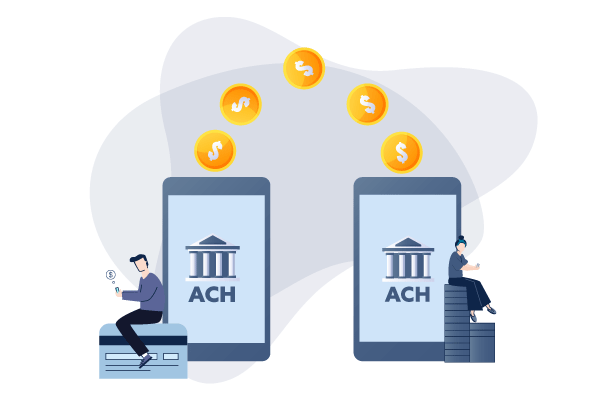ACH payments, or Automated Clearing House payments, have become an increasingly popular way for businesses and consumers to make payments online. ACH payments offer a convenient and secure way to transfer funds between bank accounts without the need for physical checks or credit cards. If you are looking for the best way to make ACH payments online, then go for online banking, and Zil.US provides one of the best online banking experiences.
What Is Electronic Fund Transfer (EFT)?
Electronic fund transfers allow you to transfer money from one bank to another. Paper documents aren’t needed, so the process goes much faster. As a result, electronic bank transactions are more accessible than other payment methods.
When you use a computer to transfer money from one bank account to another, this is known as an electronic fund transfer, or EFTS. They are entirely completed without the assistance of bank personnel. There is no need for paper records because these are digital transactions.
Automated Clearing House (ACH) Definition
The Automated Clearing House (ACH) is a financial network in the United States that sends and receives money electronically. Online ACH payments are examples of electronic payments. They are used for bill payments and direct deposits. ACH is also used for a variety of commercial purposes.
The ACH network, which allows banks to send money quickly and securely from one account to another, is managed by the National Automated Clearing House Association, or NACHA.
What Is NACHA?
NACHA, also known as the National Automated Clearing House Association, is a nonprofit organization that oversees the Automated Clearing House (ACH) network in the United States. The ACH network is a batch processing system facilitating electronic funds transfers (EFT) between banks and other financial institutions.
NACHA provides rules and standards for the ACH network, ensuring that transactions are processed efficiently, accurately, and securely. It also develops and maintains the operating rules and guidelines for the ACH network, which financial institutions and businesses use to govern ACH transactions.
Types of ACH Transaction
The ACH network is composed of two distinct types of transactions:
- ACH credits
- ACH debits
When money are sent from one account to another, typically an originating account, the phrase “ACH credit” refers to the transaction. Debit transfers, on the other hand, involve the beneficiary account taking money from the originator account.
Same Day ACH
Same-Day ACH is a new rule allowing payments to be made more quickly. The people in charge of the ACH network, NACHA, implemented this rule to meet market demands and ensure that money moves at the same rate as the business.
Same-Day ACH adds no new technology to the process; it simply improves how it works. It will be sent more than once per day rather than once per day. This means that funds will be transferred more quickly than before.
Not all transactions will be Same-Day by default. Banks will charge a fee for Same-Day ACH transactions for businesses that want to work faster and get their money faster.
Advantages of ACH
- Convenience
- Easier recurring billing
- Preferred funding compared to checks
- Fewer disputes
- More secure
- Environmentally friendly
Disadvantages
- Slow process
- Limitation on the transfer amount
- Cutoff times
- Lack of International payments
How Safe Is ACH?
The NACHA standards recommend that all parties involved in ACH payments online (paying businesses and third-party processors) adhere to security requirements, procedures, and controls. According to their rules, banking data (such as account numbers and routing addresses) must also be sent using “commercially reasonable” technology.
This means you won’t be able to receive or transmit bank data if you use an unsecured email service or an inadequately secured web server. Ascertain that your ACH processor employs strong encryption technologies and procedures that are up to date.
The Penalty Fee for Rejected ACH Transaction
If your business gets a rejected ACH payments online, you may be required to pay a fee. Try fixing the problem as soon as possible, so you don’t have to pay extra monthly fees. You might only accept ACH payments from customers you know and trust to avoid this trouble.
Some ACH Transactions Are Denied; Why?
- R01- Insufficient funds: This implies the customer did not have sufficient money in their report to cover the quantity of the debit entry.
- R02 -Bank account closed: This occurs when a customer has an account with your company, but they closed it.
- R03-No bank account or unable to locate the account: This code is used if the data you entered (either your name or account number) does not match the bank’s records.
- R29- Rejected: If a bank rejects your request to take money from someone’s account, you will get this rejection code.
ACH payments have become an essential component of the modern electronic payments landscape. They provide a secure and efficient way for businesses and consumers to transfer funds between bank accounts, without the need for physical checks or credit cards. If you are looking for the best way to transfer fund via ACH payments online, then our platform Zil.US can help you with this. Our platform provides both standard AHC, same day ACH and other EFTs methods for transferring money online.






